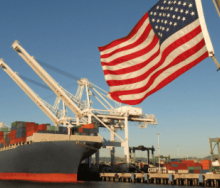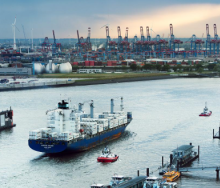The chief executive officers (CEOs) of some of the world’s leading global shipping lines have issued a joint declaration at COP 28 calling for an end date for fossil-only powered newbuilds and urged the International Maritime Organization (IMO), the global regulator, to create the regulatory conditions to accelerate the transition to green fuels.
With global temperatures breaching critical levels, creating more frequent and devastating results, they believe it is imperative for shipping to achieve IMO’s 2030, 2040, and net-zero 2050 greenhouse gas (GHG) targets. The only realistic way to meet those targets for an industry that accounts for 2-3% of global GHG emissions is to transition from fossil to green fuels at scale and at pace, they point out.
As frontrunners, the CEOs are convinced that even closer collaboration with IMO regulators will produce the effective and concrete policy measures needed to underpin the investment within maritime shipping and its ancillary industries that will enable decarbonisation to occur at the pace required.
Their joint declaration calls for the establishment of four regulatory cornerstones:
* An end date for new building of fossil fuel-only vessels and a clear GHG Intensity Standard timeline to inspire investment confidence, both for new ships and the fuel supply infrastructure needed to accelerate the energy transition.
* An effective GHG pricing mechanism to make green fuel competitive with black fuel during the transition phase when both are used. This can be done by distributing the premium for the green fuels across all the fossil fuel used. With low initial volumes of green fuels, any inflationary effects are minimised. The mechanism must also feature an increasing regulatory incentive to achieve deeper emissions reductions. Furthermore, beyond covering the ‘green balance fee’, revenue generated by the mechanism should go to an RD&D fund and to investments in developing countries to ensure a just transition that leaves no one behind.
* A vessel pooling option for GHG regulatory compliance where the performance of a group of vessels could count instead of only that of individual ships, ensuring investments are made where they achieve the greatest GHG reduction and thereby accelerating decarbonisation across the global fleet.
* A Well-to-Wake or lifecycle GHG regulatory basis to align investment decisions with climate interests and mitigate the risk of stranded assets.
In an unprecedented move, major players in the shipping industry have expressed their shared conviction that regulation can play a key role in mitigating the cost of the green transition as well as the risk of extreme weather events. Given the cost of climate change is far greater than the cost of the green transition, they hope to be joined by other companies.
AP Moller – Maersk (APM), CMA CGM, MSC Mediterranean Shipping Company and Wallenius Wilhelmsen are leading the charge.
APM CEO Vincent Clerc says a crucial next step in the transition is to introduce regulatory conditions which ensure that the most greenhouse gas emission reductions can be achieved per invested dollar. This includes an efficient pricing mechanism to close the gap between fossil and green fuels and ensure that the green choice is easier to make for customers and consumers globally.
Rodolphe Saadé, chairman and chief executive officer of the CMA CGM Group, commented:
“By collaborating with others, we each take a new step in our energy transition, while ensuring a collective level playing field and access to greener fuels for the industry.”
Rolf Habben Jansen, chief executive officer of Hapag-Lloyd, also underscored the collective responsibility for a sustainable future. “At Hapag-Lloyd, we reaffirm our commitment to advance the decarbonisation of the maritime industry and strive to be at the forefront of the energy transition. We believe that a regulatory framework and clear targets are crucial to accelerating the introduction of alternative fuels and reducing our carbon footprint.”
The carrier is committed to achieving a net-zero carbon fleet by 2045.
Soren Toft, chief executive officer of MSC, points out that the carrier’s fleet renewal strategy includes 100 dual fuel vessels. “The support of governments across the world will be an essential element to reach our common goal and among those efforts we want to see an end to delivery of ships that can only run on fossil fuels.”
Lasse Kristoffersen, president and chief executive officer of Wallenius Wilhelmsen, says a global regulatory framework is needed to drive the investments needed at a global scale.













